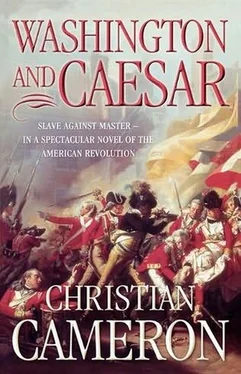Christian Cameron - Washington and Caesar
Здесь есть возможность читать онлайн «Christian Cameron - Washington and Caesar» — ознакомительный отрывок электронной книги совершенно бесплатно, а после прочтения отрывка купить полную версию. В некоторых случаях можно слушать аудио, скачать через торрент в формате fb2 и присутствует краткое содержание. Год выпуска: 0101, ISBN: 0101, Издательство: HarperCollins, Жанр: Исторические приключения, на английском языке. Описание произведения, (предисловие) а так же отзывы посетителей доступны на портале библиотеки ЛибКат.
- Название:Washington and Caesar
- Автор:
- Издательство:HarperCollins
- Жанр:
- Год:0101
- ISBN:9780007389698
- Рейтинг книги:3 / 5. Голосов: 1
-
Избранное:Добавить в избранное
- Отзывы:
-
Ваша оценка:
- 60
- 1
- 2
- 3
- 4
- 5
Washington and Caesar: краткое содержание, описание и аннотация
Предлагаем к чтению аннотацию, описание, краткое содержание или предисловие (зависит от того, что написал сам автор книги «Washington and Caesar»). Если вы не нашли необходимую информацию о книге — напишите в комментариях, мы постараемся отыскать её.
Washington and Caesar — читать онлайн ознакомительный отрывок
Ниже представлен текст книги, разбитый по страницам. Система сохранения места последней прочитанной страницы, позволяет с удобством читать онлайн бесплатно книгу «Washington and Caesar», без необходимости каждый раз заново искать на чём Вы остановились. Поставьте закладку, и сможете в любой момент перейти на страницу, на которой закончили чтение.
Интервал:
Закладка:
“Miss Betsy, Marquis. And now she’s ‘of New York.’ We write, and I dare say we’re affianced, except no banns have been called. But I doubt we’ll wed before the war is over.”
“That is romantic, George. I hope it makes you concentrate on the matter at hand, so you desire victory above all things. But I wrong you. You were always a true believer, and you have already put the cause first.”
Lafayette looked at the earnest George, no longer quite so young. He had lines on his face and frost in his hair from five years of constant campaigning, and if he had more of the air of a gentleman than he had the last time Lafayette saw him, he had purchased it in blood. Lafayette thought George might be the archetype of the knight, the warrior who earned his name and escutcheon in the field and founded a great name.
A servant brought the marquis a lit pipe, which he savoured. “You know, I have not smoked since I left the field in America. And now I come back to it. Very pleasant.” He pulled his feet under him in the wingback chair and curled sideways so that he faced George, a silk brocade dressing gown pulled loosely around him. No one would have mistaken him for American. He was too small, his features too open and soft. A pretty female servant came in with a pan of warm water, which she placed by the marquis, who watched her with interest. He continued as she built up the fire, and she caught his eye, then lowered hers and smiled. She curtsied and was gone.
Lafayette smiled to himself. Then he looked back at George.
“I have missed this country.” He waved his pipe. “And not just the pleasures of it. Do you know if I am to have a command?”
George leaned forward. “I only know the rumor, but it is said you are to have a division of all the light troops in the army.”
Lafayette punched the air with his pipe and gave a little shout.
“It’s true, then. That is what I was promised in France. And, George, I will see to it that I have your company as well. We shall be the elite of the army, and we shall lead the way to victory.”
Tatawa, New Jersey, October 13, 1780
George sat in his tent, a fine small marquee he had inherited from Lafayette, and wrote his second letter of the day to Betsy, briefly describing his patrol and then transcribing a poem from a book provided by the marquis. George’s preoccupation with writing to Betsy and reading her letters had improved his literacy to the extent that he had been acting as Lafayette’s adjutant when Colonel Laurens wasn’t available.
His French was also improving. Throughout the summer he had moved between the American camps and the French camps, carrying letters for the marquis and answers from the French staff, all of whom he now knew with some degree of intimacy. He could conduct a conversation with Lafayette’s father-in-law the Comte de Noailles, although the content of such conversations usually made him blush. Indeed, Laurens often joked to George that he’d had to learn a whole new vocabulary to deal with the aristocrats. They wanted to fight, and sometimes fought each other, but when no fighting was available their every thought turned to women.
George finished translating the poem, wrote it out fair and then built up the fire in his brazier, but a soldier called out from the door and asked him to attend the marquis immediately. He picked up the book and walked out of his tent and up the hill to his general. When he saw that Lafayette was entertaining General Washington he turned away, but Lafayette beckoned to him before he could slip off. Washington still had the power of a god for George Lake. He stood at attention until Lafayette invited him to sit. Washington inclined his head in greeting and Lake feared that the great man was angry at his intrusion.
A servant poured George a Madeira in one of the marquis’s exquisite glasses, and George touched it to his lips while Lafayette went back to his story about Madame d’Hunolstein. George had suspicions, fostered by the Comte de Noailles, that despite Lafayette’s love for his wife, he and Madame d’Hunolstein were more than just friends. Washington apparently thought the same, because he tapped his foot as the story drew toward a difficult conclusion. Lafayette blushed at his hero’s discomfort and changed the subject abruptly.
“You know that General Gates has been beaten badly in the south?” Lafayette directed this at George, who shook his head.
“We have lost Charleston and now we look to lose much of the back country. That is not the worst of it, George. I don’t want this spread to the camp at large, but you read my correspondence and it is only fitting that you know.” He looked at Washington, who turned his head away. It startled George, the raw emotion stark and open on Washington’s face: rage and something else. He shrank back into his chair.
“General Arnold has attempted to betray West Point to the enemy. Having failed, he has fled to New York.”
“The wretched traitor,” said Washington in a whisper.
George gulped. He was adept at handling men under fire, but this was different. He now understood Lafayette’s story: he had been attempting to divert Washington from his rage. George searched for something to say.
“That’s terrible,” was the best he could do.
Washington drank off the rest of his Madeira, his head turned away.
“I am poor company, my friend,” he said bitterly, and there was a sharp click. Washington looked at the fine glass he had just broken by the pressure of his hand, and shook his head. He tossed the glass through the door of the tent.
“My cloak!”
“But, General. You mustn’t think to go yet. Let us entertain you…”
“My thanks, Marquis. Captain Lake. I’ll not burden you, gentlemen. Nelson and I will see the evening out.”
He shrugged into his cloak and gave a little bow from the door, stooping low to get his head through the tent flap. His leaving was as if a lamp had gone out, so intense was his presence.
“Bah,” said Lafayette angrily. “Arnold was never more than the sum of his ambitions. We are better without him.”
“He was at Boston with the general. I believe Washington had a feeling for him.”
Lafayette smiled at Lake. “You know, you are too good for this world, George Lake. Do you know that many of the generals hate one another, and all strive for his approval or that of Congress, or both?”
“Yes,” said George simply. “It’s all one to me, sir.”
Lafayette poured himself more wine.
“If he were less a god…”
“How do you mean, sir?”
“Oh, if it were the old Marechal de Noailles, I would send for one of the ladies of the camp, who would dance and laugh and take him to her bed and that would be the end of his rage. You Americans are not immune to the charms of Venus, but he is. He wants to return to Martha and only Martha. Would that I were so constant.”
“You want to return to Adrienne; you speak of her every day.”
Lafayette looked at George, hard, as if he feared to be made game of. Then he looked away, swirled his wine and stood up suddenly.
“This has affected me more than I realised. I am a bore. You think only of your Betsy, and perhaps you Americans are immune to Mademoiselle Venus after all. You are all great men.” The marquis sounded bitter, a side of him George had never witnessed before.
George took a deep breath. “I’m not a perfect man, Marquis. I’m a soldier. I’ve lain with other women an’ thanked ’em for it. But I wouldn’t ask one to go to the general. An’ he wouldn’t want it. An’ Betsy seems so far away, for all she’s just across the river.” He paused in thought for a moment, and then plunged on. “Think we’ll ever win this war? When we lost Charleston I thought of quitting. An’ you know what held me, Marquis? It wasn’t love of my country. It was the knowledge that there’s nothing else I’m good for. I’ve been a soldier so long I can’t go back, can I? I can’t make hats for the gentry in Williamsburg, although five years ago that was my only ambition.”
Читать дальшеИнтервал:
Закладка:
Похожие книги на «Washington and Caesar»
Представляем Вашему вниманию похожие книги на «Washington and Caesar» списком для выбора. Мы отобрали схожую по названию и смыслу литературу в надежде предоставить читателям больше вариантов отыскать новые, интересные, ещё непрочитанные произведения.
Обсуждение, отзывы о книге «Washington and Caesar» и просто собственные мнения читателей. Оставьте ваши комментарии, напишите, что Вы думаете о произведении, его смысле или главных героях. Укажите что конкретно понравилось, а что нет, и почему Вы так считаете.












